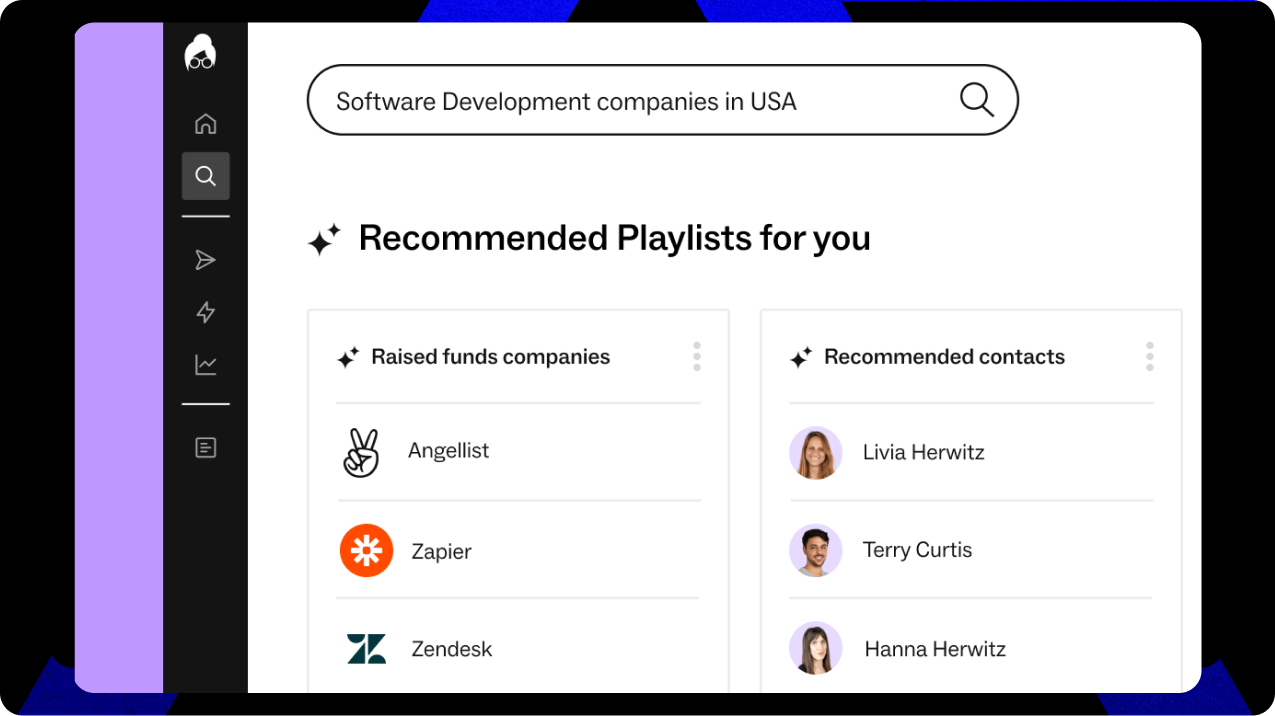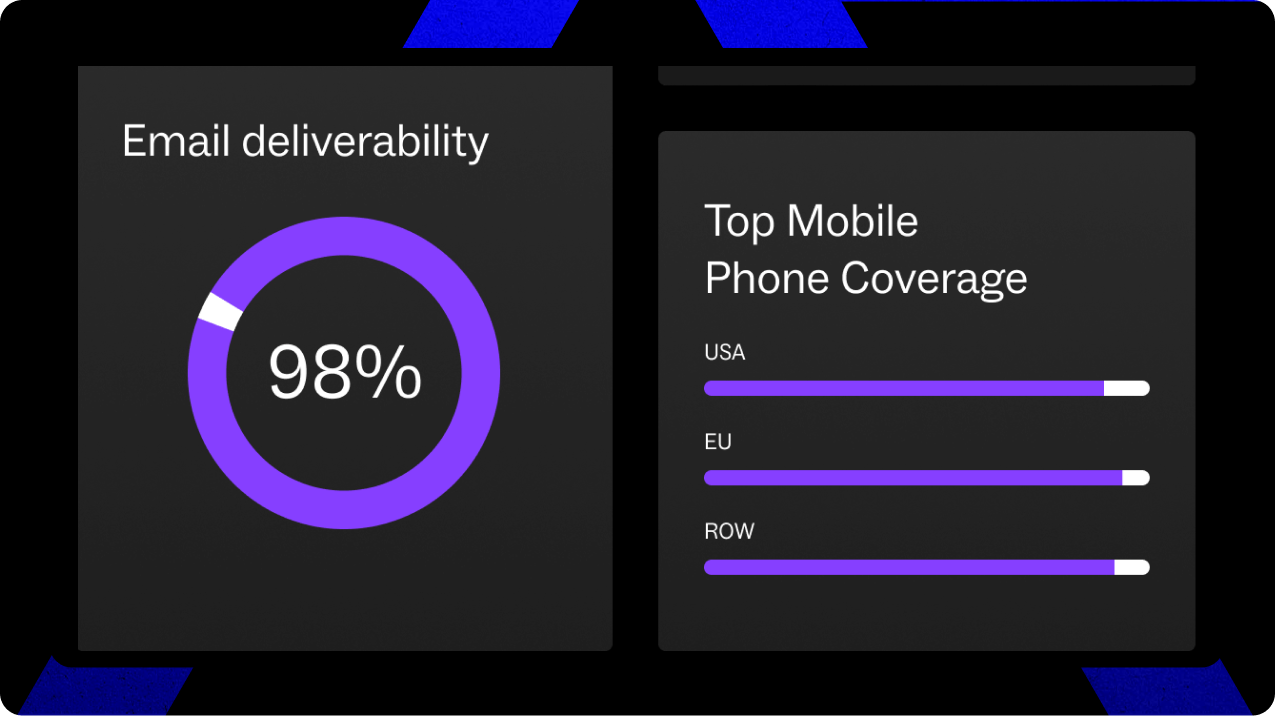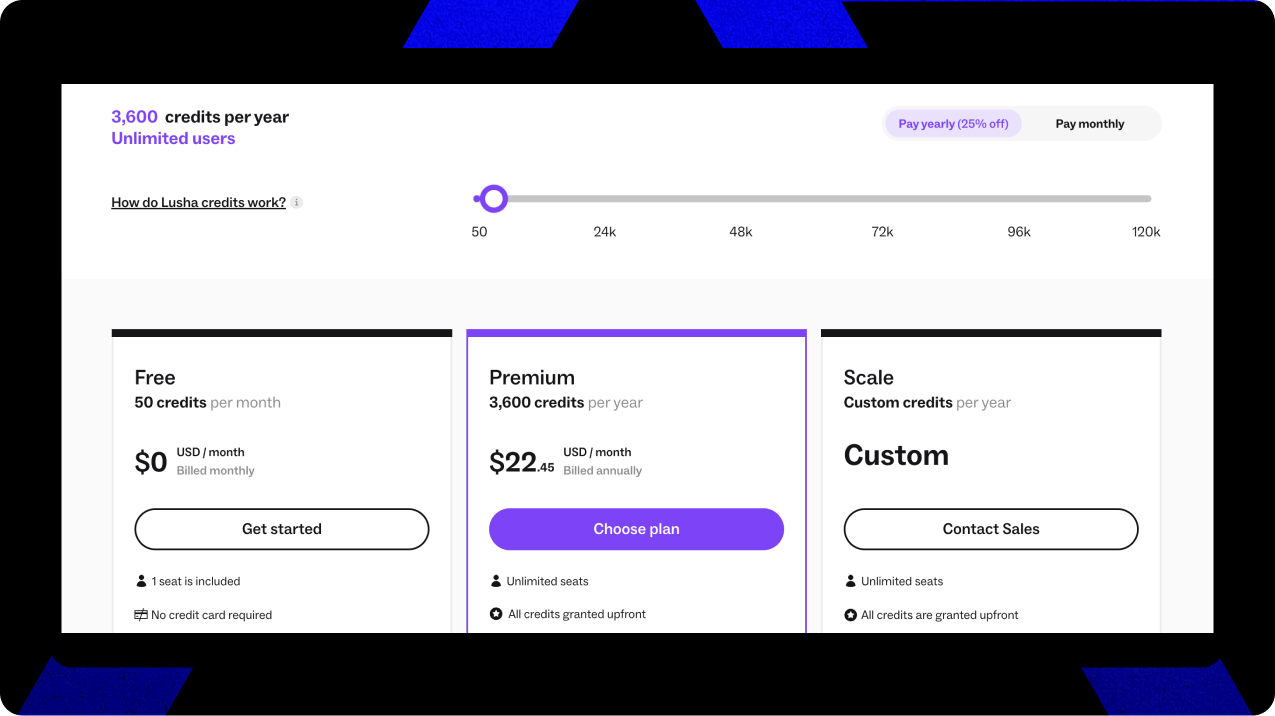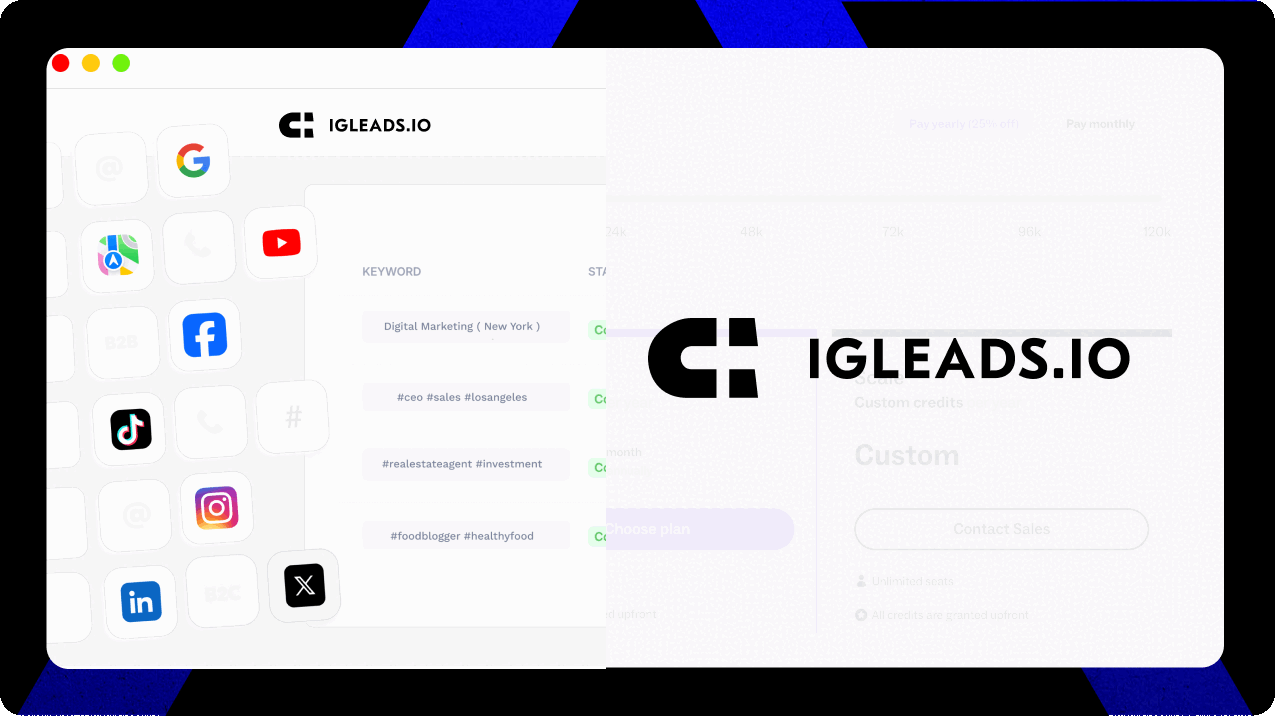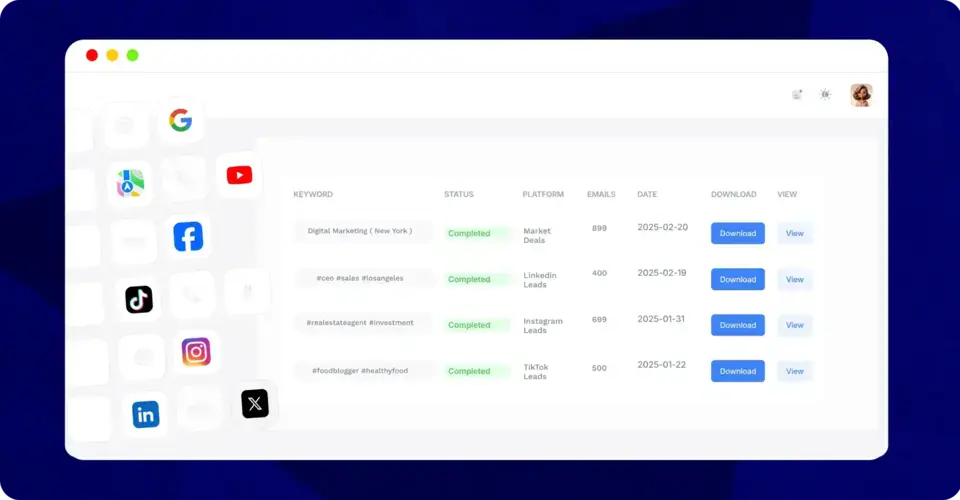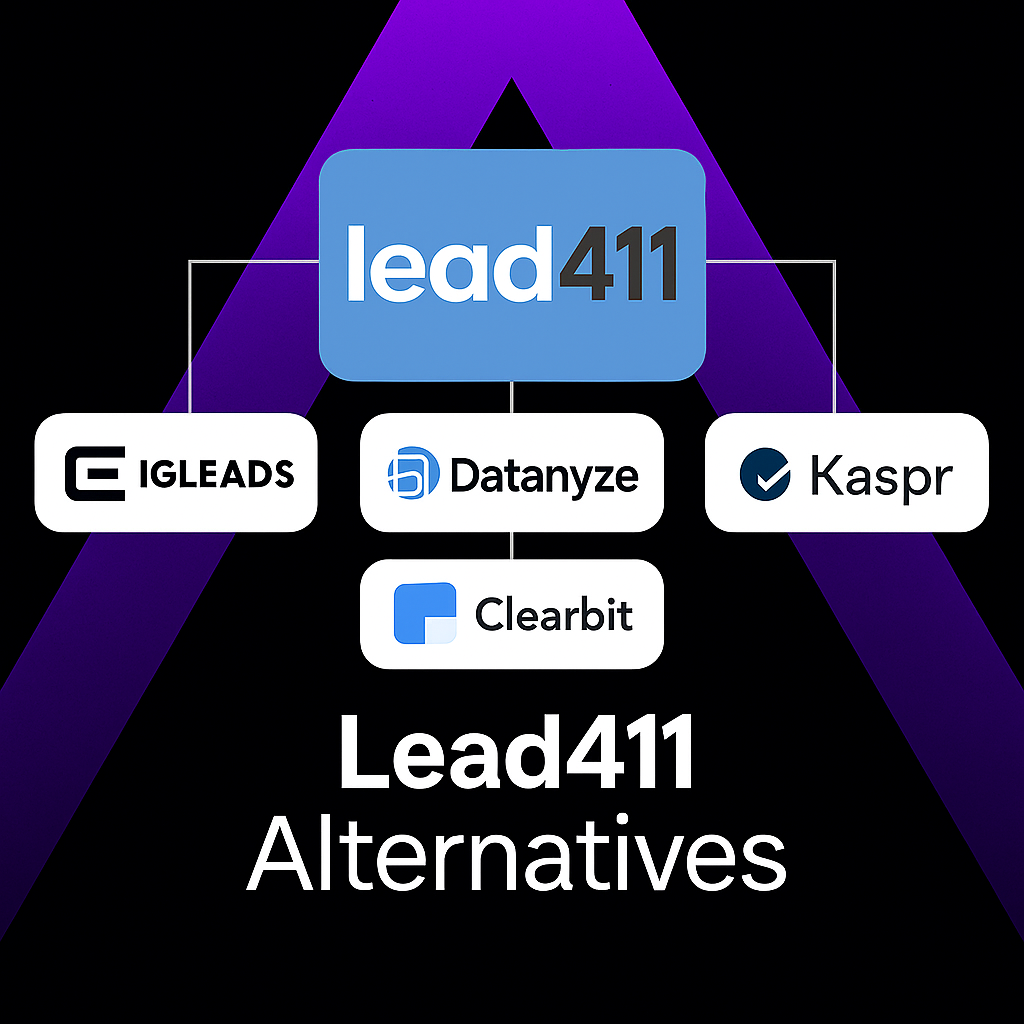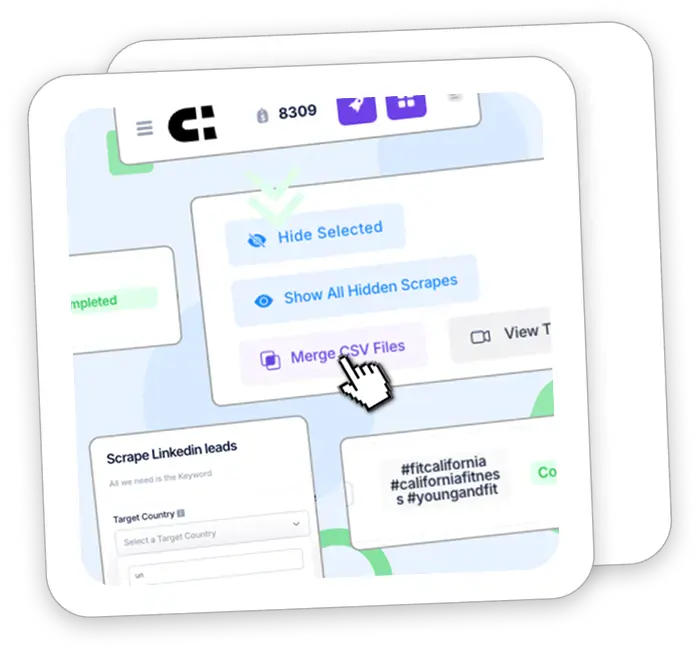Lusha Review 2025: Is This Lead Data Tool Still Worth It?
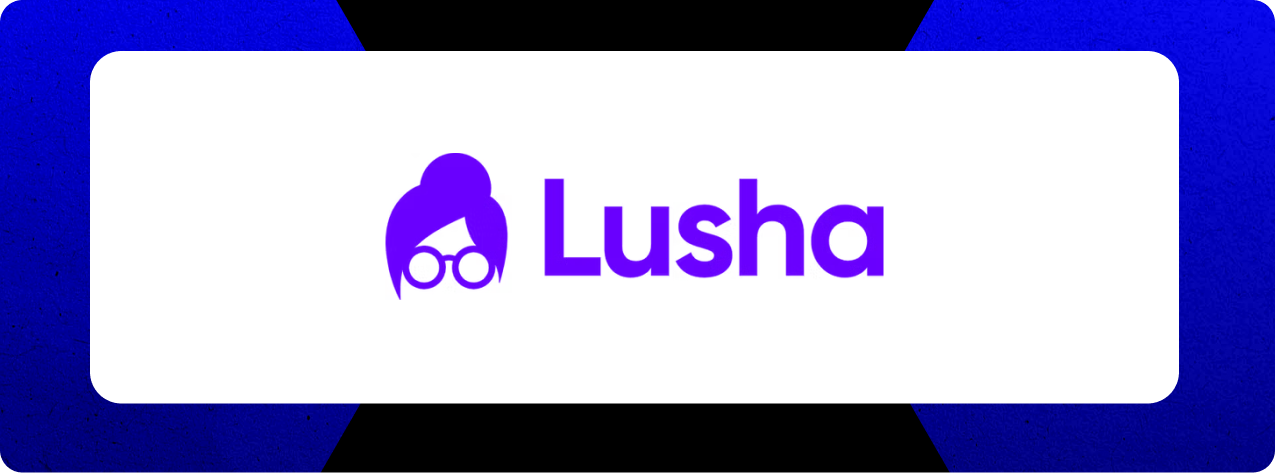
Lusha has quietly carved out its own niche in the sales intelligence and lead enrichment world, helping thousands of teams access verified contact data globally. But with so many alternatives flooding the market, including modern email scraper tools, sales teams in 2025 are asking: is it still worth it, or are there sharper, more flexible tools out there?
Pros:
- Accurate direct dial and email data
- Simple, intuitive interface
- Fast enrichment for sales teams
Cons:
- Smaller database vs. Apollo or ZoomInfo
- Limited multichannel outreach features
- Pricing can escalate fast for growing teams
Our Rating:
- Contact Data Accuracy ⭐⭐⭐⭐
- Database Size ⭐⭐⭐
- CRM Integration ⭐⭐⭐⭐
- Email Automation ⭐⭐
- Data Enrichment ⭐⭐⭐⭐
- Chrome Extension ⭐⭐⭐⭐
- Pricing Transparency ⭐⭐⭐
This isn’t another surface-level review filled with feature lists. We’re diving into real user experiences, performance data, and seeing how Lusha stacks up in 2025 against other options.
By the end, you’ll know exactly whether Lusha deserves your subscription, or if you’re better off with a different platform.
So… what exactly is Lusha?
Lusha is a B2B lead enrichment platform that helps sales teams, recruiters, and marketers find direct contact information, like personal emails, work emails, phone numbers, and company details. Unlike some larger tools that try to be full outbound engagement platforms, Lusha focuses narrowly on giving you accurate data to plug into your outreach workflows.
With a simple browser extension, CRM integrations, and real-time data enrichment, Lusha allows you to quickly verify contact information while browsing LinkedIn or company websites without complicated filters or sequence builders.
It’s ideal for:
- Outbound SDR teams that need verified phone and email data fast
- Recruiters sourcing talent via LinkedIn
- Small sales teams that don’t want to overpay for bloated all-in-one systems
But if you’re looking for advanced automation, intent data, or multichannel sequencing, Lusha isn’t designed for that. Its core strength is clean, verified contact data.
Core features of Lusha
Contact data accuracy ⭐⭐⭐⭐
Lusha’s strongest edge is still its clean contact data, especially for small and mid-market B2B companies. While its total database isn’t as massive as Apollo or ZoomInfo, many users report that the actual data they pull tends to bounce less, which, at the end of the day, is what really matters for outbound.
The platform combines publicly available data, proprietary sources, and user-contributed verification, running it all through internal algorithms that update and score contacts regularly. Based on real-world usage reports across Reddit, G2, and sales communities, teams often see email accuracy rates between 85%–90%, and direct dial success rates sometimes surpass ZoomInfo in certain industries.
This makes Lusha especially attractive for:
- SMBs & startups
- Non-public companies
- Professional services & agencies
- Tech sales targeting mid-market buyers
That said, Lusha’s database isn’t bottomless. If you’re prospecting highly technical job functions, obscure verticals, or certain international markets, you’ll likely hit more gaps compared to the larger providers. Enterprise-level coverage remains its biggest blind spot.
Database size ⭐⭐⭐
When it comes to total database size, Lusha is smaller than Apollo, ZoomInfo, or Cognism, but intentionally so. While Apollo advertises 275M+ contacts, Lusha operates a leaner database typically estimated around 100M profiles, focusing on higher-accuracy phone numbers and decision-makers rather than bloating the system with outdated records.
This smaller footprint means better quality for many mid-market sales teams, but limits your total addressable audience if you’re targeting highly segmented industries, international markets, or running global enterprise campaigns. For hyper-targeted prospecting in North America or Europe, Lusha performs well. For high-volume enterprise prospecting, it may feel restrictive.
CRM integration ⭐⭐⭐⭐
Lusha plays nice with most mainstream CRMs and sales platforms: Salesforce, HubSpot, Outreach, Pipedrive, and Zoho. The integration process is straightforward. You authorize the connection, map fields, and instantly sync enriched contacts into your CRM.
Benefits include:
- Real-time enrichment as reps browse.
- Cleaner data hygiene across the pipeline.
- Less manual copy-pasting for SDRs.
- Trigger workflows automatically as enriched contacts enter your CRM.
However, custom CRM setups may need more configuration. If your CRM uses non-standard fields or complex automations, some mappings require manual adjustment. Lusha’s documentation is solid, but smaller teams without technical support may hit a learning curve when integrating advanced fields.
Email automation ⭐⭐
No sequences. No cadences. No multichannel outreach. Lusha is a pure data vendor, not a sales engagement platform.
Once you pull contacts, you’ll need to use external tools like Outreach, Salesloft, Lemlist, or Instantly to run email sequences. While some users appreciate this simplicity (clean data without the bloat), others find it frustrating that Lusha hasn’t expanded into outbound automation like its competitors.
In short: if you need a full-stack outbound system, Lusha won’t do it alone.
Data enrichment ⭐⭐⭐⭐
For teams sitting on partial, outdated, or scraped lists, Lusha’s bulk enrichment tool is one of its most practical features. You can upload CSVs of company names, domains, or partial contacts, and Lusha fills in missing fields automatically: emails, phones, job titles, seniority, company revenue, headcount, and more.
Bulk enrichment is fast, highly accurate for North America and Western Europe, and easy to trigger. But enrichment credits are limited based on your plan, and burning through large datasets can get expensive fast if you’re constantly uploading big lists.
Pro tip: Lusha is often strongest when you enrich smaller, more targeted lists, not huge bulk databases. The ROI drops on massive enrichments where hit rates naturally decline.
Chrome extension ⭐⭐⭐⭐
The Lusha Chrome Extension is one of the fastest and most frictionless tools in B2B prospecting. While you browse LinkedIn, company websites, or online directories, Lusha instantly shows you available work emails, personal emails, and phone numbers with just one click, no exporting, no scraping, no spreadsheet gymnastics.
The extension integrates well into daily workflows:
- Visit a profile → get contact info instantly.
- Push leads directly into Salesforce, HubSpot, or Outreach.
- Tag and organize prospects as you browse.
The big limitation: Lusha’s Chrome extension is highly manual. You’re enriching one contact at a time, not scraping li
Pricing transparency ⭐⭐⭐
Lusha’s pricing model starts simple, but can quickly get messy as you scale. Individuals can test the platform on a free trial, with paid plans starting at around $39/user/month for smaller teams.
Where things get tricky:
- Enrichment credits are limited and require constant monitoring.
- Scaling your team means negotiating per-seat pricing directly with sales reps.
- Enterprise contracts rarely show clear public pricing, leading to inconsistent costs between companies.
Many small teams appreciate the low entry point, but as you grow, costs can creep toward ZoomInfo territory, without ZoomInfo-level features. Always request custom quotes and carefully audit enrichment credit usage before upgrading.
How to sign up for Lusha
Getting started with Lusha is very simple and takes just a few minutes.
- Go to Lusha.com and click “Start for Free”.
- Create an account using your work email address (free trials are available but limited).
- Install the Lusha Chrome Extension to start enriching profiles directly on LinkedIn and websites.
- Connect your CRM (Salesforce, HubSpot, Outreach, or Pipedrive) for direct syncing of enriched data.
- Upload your existing leads or start searching inside Lusha’s platform for new contacts.
Lusha pricing in 2025: What you’ll actually pay (and where it gets expensive)
Lusha’s pricing is based on credits, team size, and access levels. While it starts with an affordable entry point, most users will eventually need to upgrade as their usage grows, especially if they want more enrichment credits or CRM integrations.
Key points about Lusha pricing:
- Free Plan: Limited credits for email and phone lookups (usually 5 credits/month). Good for personal testing but not scalable.
- Pro Plan: Starts at around $39/month per user. Includes higher monthly credit limits and limited CRM integration.
- Premium Plan: Around $59–$79/month per user depending on features, includes more credits and advanced integrations.
- Enterprise Plan: Custom pricing for large teams, higher credit volumes, and full CRM syncing.
As with most sales intelligence tools, pricing gets complex as you scale. Additional enrichment credits, extra seats, and enterprise integrations can all drive the cost up, sometimes approaching similar price levels as ZoomInfo or Apollo for larger companies. Always ask for custom quotes if your team is growing.
IGLeads pricing overview
We won’t sugarcoat it! IGLeads is cheaper, faster, and easier to scale than Lusha.
- Monthly Plans: Start at $49/month for access to all scrapers and limited exports
- Unlimited Plan: $249/month for unlimited scrapes and downloads
- Annual Plans: As low as $39/month when billed yearly
Lusha reviews: real user feedback in 2025
We went way beyond the polished marketing pages. We dug into dozens of real user reviews, G2 ratings, Reddit threads, and sales community discussions to see what people actually say about Lusha after using it day-to-day. Some love how simple and accurate it is, others get frustrated once they start scaling. As always, the real story lives somewhere between the hype and the complaints — so here’s what we found out.
| Lusha | Reviews Summary |
| Pros | Cons |
| ✅ Highly accurate mobile numbers | ⚠️ Smaller database vs competitors |
| ✅ Simple Chrome extension | ⚠️ No multichannel automation |
| ✅ Easy CRM integration | ⚠️ Limited global coverage |
| ✅ Great for small & mid-market sales | ⚠️ Pricing increases quickly for larger teams |
| ✅ Quick enrichment capabilities | ⚠️ No email sequences or dialer |
On G2, Lusha holds a strong 4.3/5 rating based on thousands of verified users.
Despite the overall good reviews, there’s always room for improvement. Stephen L, head of revenue operations, typed the following:
“Do NOT Buy Lusha: Functionality Gaps, Support Gaps, Difficult to work with”
It is a big contrast when you see what Preeti S. wrote:
“Boost Your Business Productivity with LUSHA”
In sales communities like Reddit, users generally praise Lusha’s simplicity but recommend pairing it with other outreach platforms for full workflows.
On TrustPilot, the reviews are more mixed, often pointing out pricing complaints or feature gaps compared to full-stack alternatives. The most recent user reviews have been negative. The tool has only 1.4 out of 5 stars.
Anne Lazarakis shared her experience:
We’ve been trying really hard to resolve a disagreement on what we purchased from Lusha versus what they delivered. Advice is to be vigilant with contracts and assess carefully during the period you can opt out. We raised issues within 30 days but they didn’t resolve them and then told us after we were passed the 30 day period so were not eligible for refund.
Lusha vs IGLeads: Where each one actually fits
Reading Lusha reviews only gives you one side of the story. Once you actually start prospecting, you realize very quickly where it shines and where it hits walls. That’s exactly where IGLeads has built its lane for sales teams in 2025.
While Lusha is great for fast contact enrichment and solo reps grabbing emails off LinkedIn, IGLeads.io has become the tool of choice for people who want full control over their lead generation. It’s designed for growth-focused marketers, agency owners, scrappy founders, and small sales teams who don’t want credit limits, hidden fees, or seat-based pricing.
Lusha gives you solid data one lead at a time. IGLeads helps you build full, targeted lists instantly. There is no credit system, no negotiations, just raw data you can export and use.
IGLeads features and benefits
IGLeads is a scraping-first lead generation platform built for 2025 outbound prospecting. It allows you to pull niche, hyper-targeted leads directly from platforms that Lusha doesn’t touch natively, including:
- Instagram (search by keyword, hashtag, or location)
- LinkedIn (profiles, search pages, Sales Navigator)
- Google Maps (local businesses, verified contact info)
- YouTube (creators and channels by niche or video topics)
You don’t need to mess with APIs or burn through enrichment credits. Just run your scrape, apply filters, and download verified leads instantly. Simple as that.
IGLeads also includes:
- Built-in email extractor
- Unlimited scrapes (depending on your plan)
- Smart filters for bio keywords, followers, niche targeting, geography, and more
- CSV exports for cold email tools and CRM imports.
It’s especially useful for agency work, local lead gen, ecommerce brands, influencer outreach, freelancers, and teams doing niche B2B prospecting. Basically anyone who needs data now without getting locked into enterprise contracts.
How IGLeads complements Lusha
In reality, plenty of teams use both.
Lusha helps you quickly grab contact info for known decision-makers you’re already targeting on LinkedIn or through your CRM. But when you want to go after:
- Non-traditional audiences
- Influencers or creators on Instagram, YouTube, or TikTok
- Local businesses on Google Maps
- Hyper-specific keyword-based searches
- Unlimited scraping without credit caps
IGLeads fills that gap and gives you far more flexibility on how and where you build lists. Think wedding photographers in Miami, real estate agents in Toronto, or coaches who’ve posted about “booked out” on Instagram. These are exactly the kind of segments that traditional enrichment tools like Lusha simply don’t cover.
On top of that, you skip the complicated credit systems and enterprise pricing models. IGLeads runs on simple flat-rate pricing: unlimited scraping (depending on the plan), no surprises, no negotiations.
| Feature | Lusha | IGLeads |
| Scraping LinkedIn | ✅ (Via Chrome extension) | ✅ |
| Scraping Instagram | ❌ | ✅ |
| Scraping Google Maps | ❌ | ✅ |
| Pricing Simplicity | ❌ (Per-seat + credit tiers) | ✅ (Flat-rate) |
| Lead Export Limits | ⚠️ (Limited credits) | ⚠️ (No restrictions on Unlimited plan) |
| Built for Niche Segments | ⚠️ (Limited) | ✅ |
| Real-Time Filtering | ✅ | ✅ |
| Chrome Extension | ✅ | ❌ |
Bottom line: if you need fully customized, scalable, real-time list building, especially outside of traditional B2B, IGLeads gives you way more control at a way lower cost.
Is Lusha a smart fit, or an expensive mistake?
If you’re a solo founder, recruiter, or small sales team who just needs solid phone numbers and emails , fast, Lusha makes life pretty easy. The Chrome extension is dead simple, enrichment works smoothly, and you won’t waste hours figuring out complicated dashboards.
But if you’re trying to build full-blown outbound sequences with automation, multichannel cadences, or AI-powered intent data, Lusha’s not really built for that. You’ll still need to stack it with other tools to actually run full campaigns.
Bottom line: Lusha keeps it simple and does what it’s supposed to do: verified contact data. But if you’re scaling up and need more advanced prospecting power, tools like Apollo, IGLeads, or ZoomInfo might give you way more flexibility for your money.
Related to Lusha
- Lusha vs ZoomInfo in 2025: Which Sales Tool Should You Choose?
- 15 Best Lusha alternatives for 2025 (ranked): Stop wasting credits & get better leads
Frequently Asked Questions
Yes, Lusha is a legit platform used by thousands of companies for B2B contact data. They pull data from public sources and proprietary partnerships, and their accuracy is generally solid, especially for email and mobile numbers. That said, like any database, some records may be outdated depending on your target market.
Most users report email accuracy around 85–90%, with mobile number accuracy being one of Lusha’s stronger points. It’s generally more accurate for SMBs and mid-market companies than for niche or global enterprise segments.
No, Lusha focuses only on providing contact data. You’ll still need external tools like Outreach, Salesloft, Instantly, or Lemlist to actually run outbound campaigns. Lusha doesn’t include sequences, cadences, or automation workflows.
Yes, Lusha is pretty popular with startups and lean sales teams that just need fast, verified data to plug into their outreach workflows. It’s easy to use, doesn’t have a big learning curve, and gets you direct dials and emails quickly.
It depends on your use case. If you want full sales engagement features, Apollo or ZoomInfo offer all-in-one solutions. If you want niche scraping and unlimited list building across platforms like Instagram, Google Maps, or YouTube, IGLeads can be a much more flexible option — especially for agencies or hyper-targeted prospecting.
